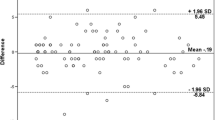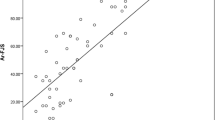Abstract
Knee complaints and their accompanying functional impairments are frequent problems encountered by healthcare practitioners worldwide. Plenty of functional scoring systems were developed and validated to give a relative estimation about the knee function. Despite the wide geographic distribution of Arabic language in the Middle East and North Africa, it is rare to find a validated knee function scale in Arabic. The present study is aimed to translate, validate, and culturally adjust the Knee Outcome Survey: Activities of Daily Living Scale (KOS-ADLS) into Arabic language for future use among Arabic-speaking patients. Permission for translation was obtained from the copyrights holder. Two different teams of high-level clinical and linguistic expertise conducted translation process blindly. Forward–backward translation technique was implemented to ensure preservation of the main conceptual content. Main study consisted of 280 subjects. Reliability was examined by test–retest pilot study. Visual Analogue Scale (VAS), Get Up and Go (GUG) Test, Ascending/Descending Stairs (A/D Stairs), and Subjective Assessment of Function (SAF) were conducted concurrently to show the validity of Arabic KOS-ADLS statistically in relation to these scales. Final translated version showed no significant discrepancies. Minor adaptive adjustment was required to fit Arabian cultural background. Internal consistency was favourable (Cronbach’s alpha 0.90). Patients’ scoring on Arabic KOS-ADLS appeared relatively consistent with their scoring on VAS, GUG, A/D Stairs, and SAF. A significant linear relationship was demonstrated between SAF and total KOS-ADLS scores on regression analysis (adj. R 2 = 0.548). Arabic KOS-ADLS, as its English counterpart, was found to be a simple, valid, and useful instrument for knee function evaluation. Arabic version of KOS-ADLS represents a promising candidate for unconditional use among Arabic-speaking patients with knee complaints.


Similar content being viewed by others
References
Al-Arfaj AS, Alballa SR, Al-Saleh SS et al (2003) Knee osteoarthritis in Al-Qaseem, Saudi Arabia. Saudi Med J 24:291–293
http://www.lasportal.org/en/aboutlas/Pages/CountryData.aspx. Accessed 07 Sept 2015
Guermazi M, Poiraudeau S, Yahia M et al (2004) Translation, adaptation and validation of the Western Ontario and McMaster Universities osteoarthritis index (WOMAC) for an Arab population: the Sfax modified WOMAC. Osteoarthr Cartil 12:459–468
Serhier Z, Harzy T, EL S et al (2012) Cross-cultural adaptation and validation of the knee and hip health-related quality of life (OAKHQoL) in a Moroccan Arabic-speaking population. Rheumatol Int 32:1015–1023
Irrgang JJ, Snyder-Mackler L, Wainner RS et al (1998) Development of a patient-reported measure of function of the knee. J Bone Joint Surg Am 80:1132–1145
Bizzini M, Gorelick M (2007) Development of a German version of the knee outcome survey for daily activities. Arch Orthop Trauma Surg 127:781–789
Goncalves RS, Cabri J, Pinheiro JP (2008) Cross-cultural adaptation and validation of the Portuguese version of the Knee Outcome Survey-Activities of Daily Living Scale (KOS-ADLS). Clin Rheumatol 27:1445–1449
Evcik D, Ay S, Ege A et al (2009) Adaptation and validation of Turkish version of the Knee Outcome Survey-Activities for Daily Living Scale. Clin Orthop Relat Res 467:2077–2082
Kapreli E, Panelli G, Strimpakos N et al (2011) Cross-cultural adaptation of the Greek version of the Knee Outcome Survey–activities of Daily Living Scale (KOS-ADLS). Knee 18:424–427
Roy JS, Esculier JF, Maltais DB (2014) Translation, cross-cultural adaptation and validation of the French version of the Knee Outcome Survey-Activities of Daily Living Scale. Clin Rehabil 28:614–623
Beaton DE, Bombardier C, Guillemin F et al (2000) Guidelines for the process of cross-cultural adaptation of self-report measures. Spine (Phila Pa 1976) 25:3186–3191
Crossley KM, Bennell KL, Cowan SM et al (2004) Analysis of outcome measures for persons with patellofemoral pain: which are reliable and valid? Arch Phys Med Rehabil 85:815–822
Hurley MV, Scott DL, Rees J et al (1997) Sensorimotor changes and functional performance in patients with knee osteoarthritis. Ann Rheum Dis 56:641–648
Piva SR, Fitzgerald GK, Irrgang JJ et al (2004) Get up and go test in patients with knee osteoarthritis. Arch Phys Med Rehabil 85:284–289
Hefti F, Muller W, Jakob RP et al (1993) Evaluation of knee ligament injuries with the IKDC form. Knee Surg Sports Traumatol Arthrosc 1:226–234
Al-Firuzabadi (2005) Al-Qamus al-Muhit [Arabic], Beirut. Al-Resalah Publishers, Lebanon
http://www.un.org/en/sections/about-un/official-languages/index.html. Accessed 10 Sep 2015
Acknowledgements
The authors would like to thank Ali M. Arrabai and his team from the College of Languages and Translation at King Saud University for their conduction of the blinded back translation of KOS-ADLS.
Author information
Authors and Affiliations
Corresponding author
Ethics declarations
Funding
None.
Electronic supplementary material
Below is the link to the electronic supplementary material.
Rights and permissions
About this article
Cite this article
Algarni, A.D., Alrabai, H.M., Al-Ahaideb, A. et al. Arabic translation, cultural adaptation, and validation study of Knee Outcome Survey: Activities of Daily Living Scale (KOS-ADLS). Rheumatol Int 37, 1585–1589 (2017). https://doi.org/10.1007/s00296-017-3776-4
Received:
Accepted:
Published:
Issue Date:
DOI: https://doi.org/10.1007/s00296-017-3776-4




